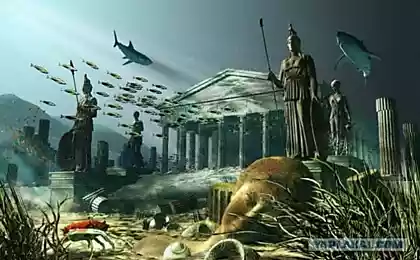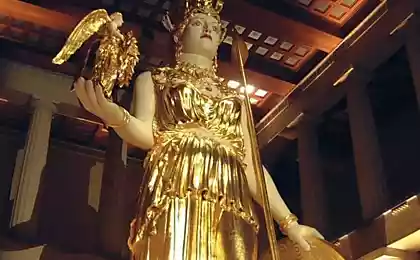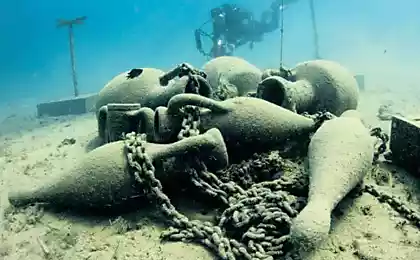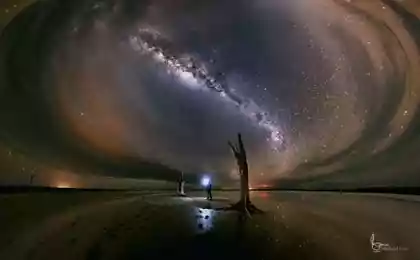327
Atlantis: everything we know about the legendary continent

Atlantis is one of the most mysterious legends that humanity inherited from ancient cultures. Mention of this supposed lost continent goes back to the writings of the Greek philosopher Plato, and since then the search for Atlantis and discussions about its reality have not ceased. For some, it is a beautiful fairy tale, for others – a historical fact that has yet to be proven by archaeologists. But what exactly do we know about Atlantis? What information has come down to us through the centuries, and why is this topic so exciting to scientists, mystics and writers?
In this article, we will take a tour of myths, hypotheses and archaeological searches related to Atlantis. Consider where the legend came from, what theories explain it, and try to understand why, even in the twenty-first century, we are still fascinated by the idea of a “lost paradise” or “advanced civilization” that disappeared overnight. The material is addressed to a wide audience and written in a popular science style with a depth close to expert, but at the same time available to everyone who is interested in the secrets of history and legendary plots.

The Origins of Legend: Plato and His Dialogues
The first and most authoritative mention of Atlantis is found in the Greek philosopher Plato (427-347 BC). In his dialogues Timaeus and Critias, he describes the country as a mighty maritime state with a high level of culture, wealth and a powerful army. According to the plot of Plato, Atlantis was located “behind the Pillars of Hercules”, that is, in the area of the Strait of Gibraltar. However, due to pride and neglect of the gods, she was flooded and disappeared in one day.
- Plato's goal: Many researchers believe that Plato used the image of Atlantis as a metaphor for the degradation of a society that has lost moral guidelines.
- The main difficulty: Plato's texts contain a number of details (geographical location, dimensions, historical details) that are difficult to verify, for they may have been part of a philosophical parable rather than an actual description.

Hypotheses about the location of Atlantis
Over the centuries, dozens of versions have been put forward of where Atlantis might have been, if it existed. Some researchers point to the Atlantic Ocean, others to the Mediterranean Sea, and still others see a connection with the legendary sunken cities of other cultures. Consider the most popular hypotheses:

1. In the Strait of Gibraltar
Some historians believe that Atlantis may have been somewhere in the Atlantic Ocean near Gibraltar, as Plato described. They suggest that a powerful cataclysm could destroy the island, leaving only underwater ruins. However, specific findings that unequivocally confirm this, yet.
2. Island of Santorini (Thera)
Interest in this Greek island arose in connection with the theory that a catastrophic volcanic eruption on Thera (circa 1600 BC) could destroy an advanced culture (possibly Minoan), inspiring the legend of Atlantis. This cataclysm was one of the most powerful volcanic explosions in history, causing a tsunami and devastation of several regions of the Aegean Sea.
3. The Bahamas and the Caribbean
Proponents of alternative views believe that the remains of Atlantis can be found in the Bermuda Triangle or Bahamian Banks. In particular, there are known discussions of the “Bimini underwater road”, which some enthusiasts consider the ruins of the ancient city. Scientific evidence that these are truly man-made structures is not enough.
4. Antarctica
An even more exotic hypothesis: Atlantis is actually Antarctica, which, in theory, could have been warmer land in prehistoric times. These ideas remain highly controversial and lack significant support from the scientific community.
Why is man so eager to find Atlantis?
On the one hand, Atlantis is a symbol of the “lost golden age”, a reflection of the dream of a powerful, noble and highly developed civilization that somehow perished due to morality or catastrophe. On the other hand, it is a myth that fuels the romance of the search for the unknown: people want to touch a great mystery, find artifacts, prove that the legend was real.
- Archetypal plot: Many cultures have the myth of a “great flood” or “lost land.” Atlantis became the western embodiment of this archetypal theme.
- Impact on pop culture: Film, literature, computer games actively exploit the theme of Atlantis - from classic adventure stories to science fiction.
Archaeological Searches and Modern View
Archaeologists and oceanographers at various times outfitted expeditions, hoping to find underwater ruins matching Plato's descriptions. To date, direct evidence of the existence of Atlantis has not been found. However, there are interesting finds indicating the existence of ancient cultures in the Mediterranean and Atlantic basins.
Modern science is often of the opinion that Plato used the story of Atlantis as a didactic myth or reworking of a number of oral legends about real natural disasters (for example, the Minoan eruption at Santorini), adapting them to his philosophical task. However, the official position is that Atlantis remains a literary or philosophical image, not a proven historical reality.

Atlantis as a symbol of cultural and personal search
Atlantis isn’t just about finding a lost island. It is also a search for a “potential higher culture” or an image of a “lost paradise” where technology and morality lived in harmony. Personally, each generation sees Atlantis as a projection of its own ideal, a dream of a perfect society that can exist “somewhere else.”
- Symbolic meaning: In psychology, Atlantis can be a metaphor for the "forgotten part of itself," potentially rich and powerful, but buried under the layer of ordinary.
- Inspiration: Like any legend, it pushes to expand the boundaries of knowledge, scientific research, creative search.

What remains the same?
Whether Atlantis actually existed or was a fictional antique parable, the idea of Atlantis has been around for more than two thousand years. Some legends are eternal questions to which humanity returns again and again. The truth about the location may never be found, but the legend itself motivates us to explore, explore new heights of science and culture of curiosity.
We can say that the main legacy of Atlantis is not in possible ruins under the seabed, but in the spirit of search and love of mysteries. And in that sense, Atlantis is alive and will live until people stop dreaming and asking daring questions about their history and place in the universe.

Conclusion
Atlantis remains one of the most attractive and controversial topics in the history of human culture. On the one hand, we have the classical texts of Plato, which gave form to the myth, on the other – a lot of research, hypotheses and unsuccessful searches for “evidence” in the ocean depths and archives of antiquities. Most scientists are skeptical of the literal existence of Atlantis, considering it a myth that reflects cultural conflicts and warns of the consequences of human pride.
However, the desire to search, to solve the mystery is a natural part of the human spirit. Atlantis may well serve as a symbol of our collective hopes for discovery, a symbol of the "lost" high culture that we may be able to build in the future, avoiding the mistakes of the past. If you’re fascinated by this legend, there’s nothing wrong with fantasizing about a global city lost under the waves. But remember to keep a sober mind, understand the historical context and not mix romance with scientific facts.
And maybe the true Atlantis isn’t somewhere at the bottom of the ocean — it’s inside each of us, as the potential for grandiose discoveries that sometimes sink into everyday routine. And if we allow ourselves to listen to the call of the unknown and can look at the world through the eyes of an explorer, perhaps we will find in our own minds a continent of new possibilities, previously hidden under a layer of stereotypes and fears.
Why are we afraid of silence? Unexpected conclusions of psychologists
The power of sleep: why sleep deprivation carries more risks than we think























